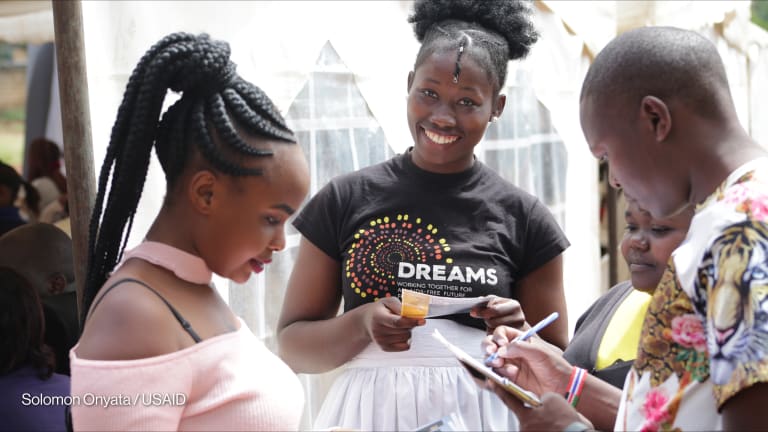
This week at the 75th World Health Assembly, member states will be deliberating a number of important issues related to noncommunicable diseases, including, for the first time, a new set of comprehensive recommendations on the prevention and management of obesity throughout the lifecourse.
The must-read weekly newsletter for exclusive global health news and insider insights.
These new recommendations come as data shows that countries are not only failing to halt the rise in obesity in line with World Health Organization targets, but the number of people with obesity is on course to hit 1 billion by 2030, or double the number of people in 2010. All too often, obesity is only considered a risk factor requiring prevention through nutrition and physical activity interventions, instead of also being addressed as a chronic disease, as defined in the 11th revision of the International Classification of Diseases which came into effect in January.
By only focusing on diet and physical activity, we are ignoring and leaving behind the millions of people who already have obesity, including those in low- and middle-income countries who are significantly impacted by inadequate health services and pervasive stigma and bias.
Here is my story — and why these recommendations, if implemented effectively and comprehensively, could be a game changer for the millions like me living with obesity.
People think that living with obesity is my fault. By overeating, being lazy, and not taking care of myself, I allowed it. When people think this, it is crushing. I know from my own experience that it wrecks an individual’s self-image, their mental health, and outlook on life.
[I] look with hope at the new comprehensive recommendations on obesity hopefully being adopted and then implemented by all member states this week.
—Since my teenage years, I have faced stigma from my peers who body shamed me and called me lazy and unproductive. When I started my journey to get my obesity treated, I saw that it was even hard for the medical community to understand that obesity is a disease.
For them, I was healthy, “chubby” even, and that was it. I kept going and found teachers and coaches who understood obesity as a disease. They helped nurture me back to a healthy BMI by helping me develop long-term health habits of physical exercise, diet monitoring, and taking care of my mental health.
To date, I still struggle with keeping and maintaining a healthy BMI because even though I am more aware of what I eat, it’s harder than ever to keep off the sugars, the trans fats, and other unhealthy food options because they are highly available, they’re concealed in our daily foods, and they are the cheaper option.
More than that, living in the city means that my local environment lacks safe walking and exercising areas; all in an area of high air pollution. These restrictions to physical activity make it harder to improve and maintain my healthy status.
However, whilst food and physical activity are critical, one of the biggest challenges is that people still think it is only about the food you eat and the physical activity you engage in. People do not understand that obesity is a complex disease with many causal factors and influences.
For these reasons, this week at the 75th WHA, I ask that governments seize the opportunity to take meaningful action. I stand in solidarity with millions who are living with obesity worldwide, and look with hope at the new comprehensive recommendations on obesity hopefully being adopted and then implemented by all member states this week.
I strongly add my voice, my experience, and my story to what should not even be a debate. We need every country to adopt the recommendations and commit to implementing them; working together to a global standard, but with local solutions.
If there is no commitment to actually implement these comprehensive recommendations at WHA, I fear for the future. If we in the health and regulatory sectors continue to delay, the chance for change will be eroded.
The food and drink industry will continue to aggressively market and produce even more unhealthy foods that flood the market, and spaces for physical activity will continue to get converted to roads and real estate. If there is no action, in another 10 to 20 years, we will see a new generation of sick people living with obesity and other NCDs.
LMICs will be hardest hit, as we see obesity rising most rapidly but health systems are poorly equipped to support those affected. In many countries that – or soon will – experience the highest obesity rates, we still see high levels of undernutrition. Supporting countries to prevent this and to provide early detection and support within primary health services is why these recommendations are so important.
But I remain optimistic.
My organization, Stowelink, and many other small organizations in Kenya, are continuously and loudly talking about obesity prevention, management, and policy. Over the past five years, there has been a significant increase in advocacy and literacy efforts. I hope this will continue and that health advocates, journalists, and champions will not rest until significant action and policy change happen.
Because I am seeing the change. I am seeing more people beginning to know about obesity; more people beginning to appreciate the fact that it’s a disease; more people beginning to get more health-conscious, and the bias and stigma are slowly but steadily changing. It is civic and nonprofit groups that are driving this change.
Obesogenic environments cannot be eliminated by individuals; it is through national governments and their policy formulation and implementation. It is also through the power of WHA and WHO that we can ensure that we live in environments that do not encourage or make it easy to engage in sedentary living, unhealthy diets, and weight stigma and discrimination.





